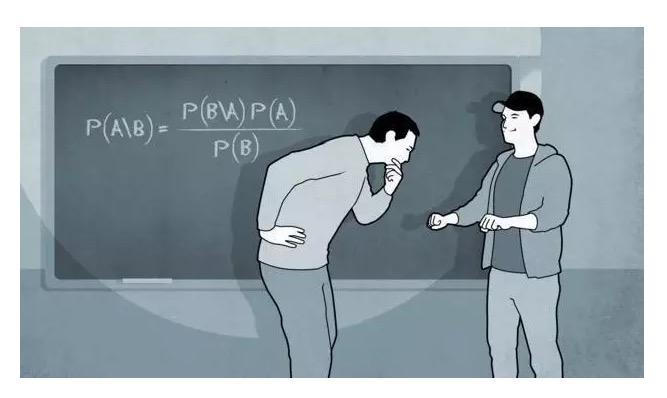A short history of risk (5) Bayes, a man who lives only in his textbooks
Author: Inventors quantify - small dreams, Created: 2017-01-03 13:22:05, Updated: 2017-01-04 10:18:42In this video, you can see a picture of a man who lives only in his textbooks.
The work of Bayes, whose birthplace is unknown, continues to demonstrate the exciting idea that uncertainty is a measure of uncertainty, and also provides us with a method of inferring unknown probabilities based on the experience of the objective world, which is the result of continuous modification of the information we receive.
It is a very strange thing that a person like Thomas Bayes, who has become a great name in the history of science, has nothing to write about his personal life. This shows that Bayes was very low-key during his lifetime, but on the other hand, it is very inconvenient for me to write such a writer, because in fact everyone likes to see the quirks of scientists, such as bad communication while being arrogant, such as the interruption of toy paranoia.

- By Thomas Bayes However, Bayes was such a boring man. He was a non-mainstream clergyman living in the English countryside, and his work on weekdays was probably to organize the whole village to square dance, no, Mass, and it is said that the whole village loved him for it. The only thing that seems a bit legendary is that he, like many legends, did not publish a book while he was alive.
When Bayes died, he left his manuscript plus £100 to a preacher named Prince. This Prince was also a strange man, and the construction of spiritual civilization and material civilization went further than Bayes knew. He felt that free will was a gift from God, and he wrote papers proving that American independence was also God's will.
Three years after Bayes's death, Prince helped him publish his obituary. But the timing of the paper's significance was faced by the academic community for another twenty years. In the paper, Bayes intended to explore the question: If we only know the number of times an event occurs and the number of times it doesn't, how should we calculate the probability of the event occurring in the absence of other information?
Let's recall the previous example ("Risk Story 4": Tom Mover and the Curve of God".); for example, for a batch of products, if we take 10,000 products and find 12 of them to be waste, what is the probability that the waste rate is 0.1% for this batch of products? For real life, this question is undoubtedly more valuable to us, because everyone's observation of things is always limited, and we need to know to what extent what we see can reflect the truth, as if we were to touch an elephant, how do we determine if we are touching the whole elephant, the leg or the fat brother next to it?
Bayes's method is actually to constantly modify old information with new information, increasing the credibility of the probability on the basis of the modification. This is the prior probability and the posteriori probability in the legend.

If we hit a ball on the table, the ball stops at any point. Then, we hit another ball repeatedly, counting the number of times it rolls to the left and right of the first ball respectively. Of course, here you can reasonably ask the question, since we are going to hit the table, why not the second ball to hit the first ball, I think you asked a good question, but I just don't want to answer.
In this example, the probability directly given for the first stop is the prior probability, and the probability of the first stop being modified based on the second stop is the posterior probability. That is, the Bayesian method is that our cognition is limited by our cognitive ability, so we need to constantly update our view with updated information.
The above sentence is probably the most compelling one yet. Let's assume an example to help us understand:
If you have opened two malls in your city, and the traffic of people in the new mall accounts for 60% of the total traffic, then at this time any customer has a 60% probability of being a customer of the new mall. This is the prior probability. And the old mall facilities are poorly managed, the staff also lack training levels, and the complaints received are twice as high as the new mall.

The simplest answer is to ask where the person is. Of course, the person will most likely answer that you guess (too low), so how can you guess that there is a greater chance of correctness? If from a preliminary probability, then you should find a manager for the new mall, because the new mall has more traffic than the old one. But from the complaint, the new mall only accounts for 1/3 of the total complaints.
Bayes, whose birth name is unknown, now appears in virtually all statistics, artificial intelligence, game theory, and genetics textbooks, causing countless problems for many university final exam candidates. His work continues to demonstrate the exciting idea that uncertainty is a measure of uncertainty and also provides us with a way of inferring unknown probabilities from the experience of the objective world, which is a result of constantly adjusting the information we receive. This way of thinking is inconsistent with the goals of our risk management and practice: in a dynamically changing market, if uncertainty exists, any outcome and decision-making depends on our inference of the latest and most comprehensive information, and such inference is equally endless.
Translated from Chinese Quantitative Investment Society
- How partial equity impacts the average price of holdings
- Bitcoin exchange network error GetOrders: parameter error
- The template of the listing system triggers the design outline of ten items
- The technical gist of the shark system trading rules
- Template 3.0: Draw line class library
- Peak and slope
- The most profitable economist, writing papers and leading economist, Tom Maynard Keynes
- Template 3.2: Digital currency trading class library (integrated Cash, futures support OKCoin futures/BitVC)
- I'm sorry, but Gauss did a small job.
- A Brief History of Risk (IV) Von Mover and the Curve of the Gods
- A brilliant explanation for the alternative to stop loss
- OkCoin China API error code requested
- 2.12 _D (()) Function and Timestamp
- python: Please be careful in these places.
- A synergistic understanding of intuition
- The hidden Markov model
- Interested in understanding the simplicity of Bayes
- 2.11 API: Simple example of use of Chart function (graph function)
- Details of the currency pair
- Beware of the Linear Mind Trap